Slipstreaming in National Colours
Having been a professional in Europe since he was nineteen, Millar rarely has cause to race in his...
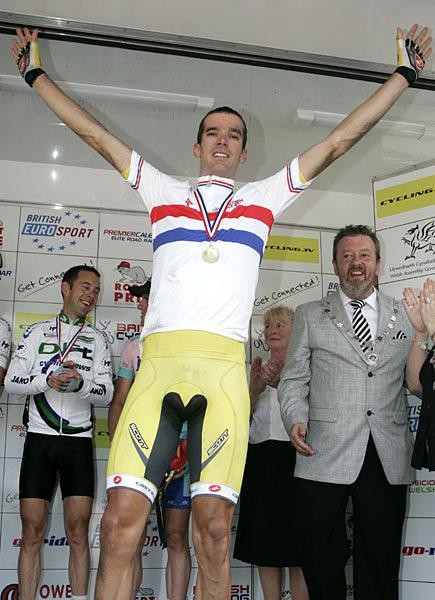
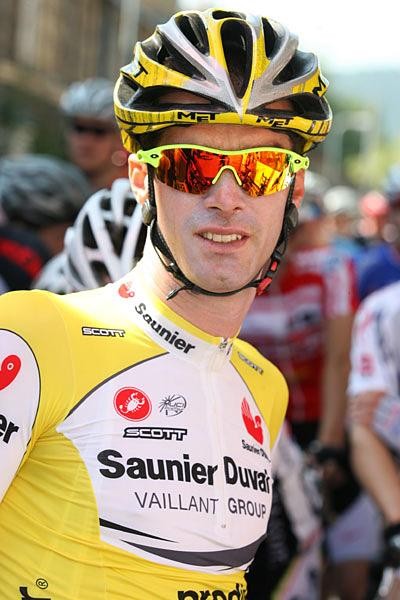
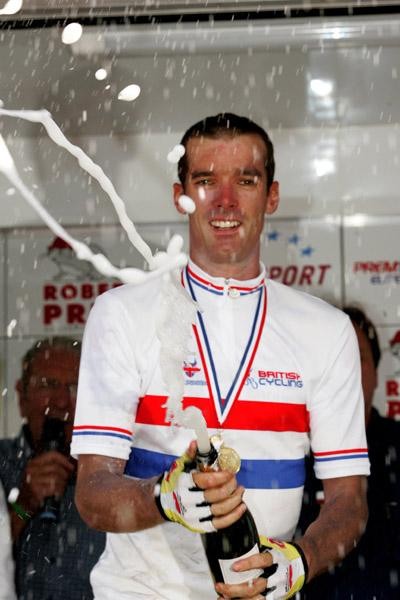
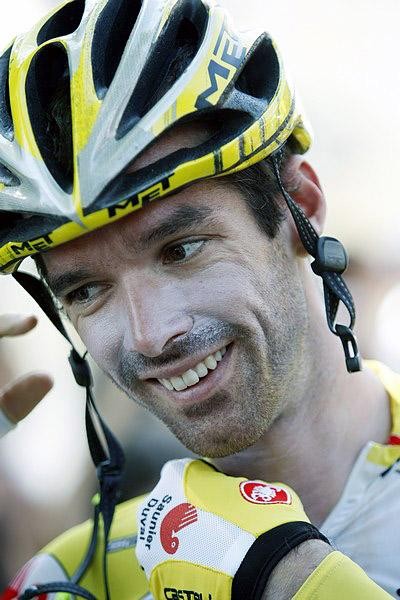
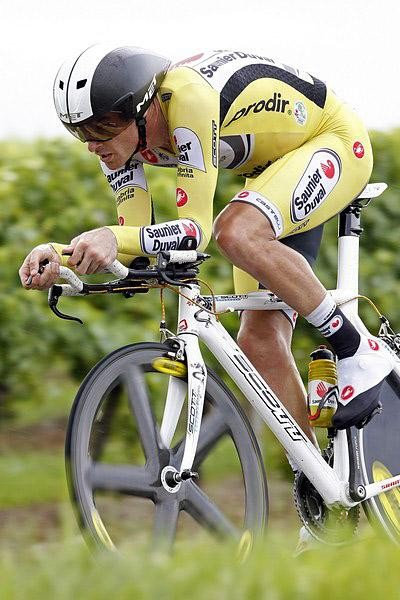
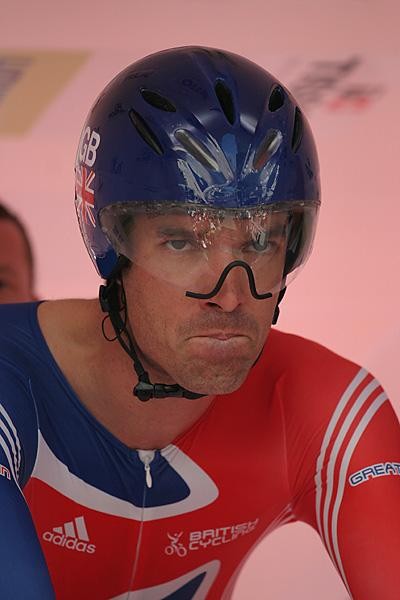
An interview with David Millar, August 12, 2007
It's not often that we have cause to interview a rider so soon after the last time we spoke. For David Millar though, the last month or so have seen a great deal of activity, making it worthwhile catching up again. Cyclingnews' UK Editor, Ben Atkins, had a good long chat with the new British Champion.
Having been a professional in Europe since he was nineteen, Millar rarely has cause to race in his home country. The rescheduled British National championships proved to be an exception though, and victory gave him the first red white and blue jersey of his career. Millar normally misses the championships in favour of preparing for the Tour de France, but when flooding in northern England forced the postponement of the race, Millar had a perfect opportunity to capture the red, white and blue jersey. "It's something that I've wanted my whole career, you know, " Millar admitted. "I hardly ever race in the UK – and being recognised as the UK's best riders for quite a while now – it's nice to have some sort of symbolism that goes with that."
As one of the few riders clad in a ProTour team kit, Millar might as well have had a gigantic target painted on his back, and he found himself closely marked by the predominantly domestic peloton - something that happens quite a bit when successful UK riders come home, and a tactic that makes winning the race that much harder. "It was worse than ever this time, there was only really me and Jez [Jeremy Hunt, Unibet.com -ed.] there, so once Jez had gone – he was [up the road] in a group of seven – I basically just had the whole race watching me. But I kind of expected that," he continued, "it's just that it's a horrible race in that respect, it was just very hard, and hard psychologically as well.
"If it had been really hilly it would have been easier for me tactically, but I had to go really hard. It doesn't matter how strong you are, it's hard when you've got 110 guys against you."
Now he's added the national championships to his palmares, Millar is also keen to take advantage of the compulsory perk that it brings, namely parading the classic red, white and blue jersey around. "Yeah, it's a nice jersey and it hasn't been out there in the big races for a while." He said, perhaps forgetting Roger Hammond's third place in Paris – Roubaix while wearing it, not to mention that Nicole Cooke has been destroying all in her path while sporting the women's version. "It would be nice for it to be recognised again. Especially as it's kind of appropriate with me going to a new team as well; it's a nice fresh start."
Slipstream and ethics
Get The Leadout Newsletter
The latest race content, interviews, features, reviews and expert buying guides, direct to your inbox!
Millar won't have to worry about the red, white and blue clashing with the bright yellow of his Saunier Duval kit for long, as it was recently announced that he will move over to the Professional Continental outfit Team Slipstream next season. With the move, he leaves the ranks of the ProTour and the security for racing all the big events that comes along with it. The decision might surprise a few, but Millar is confident in his decision. "What, a few months ago, would have been seen as a step down, now people are seeing as more a step sideways, in that the team is going to be, as its main ambition, the same as the ProTour teams – on a slightly smaller scale, but solely on numbers rather than actual quality."
It's not surprising that an outspoken anti-doper is joining an outspokenly antidoping team, and for Millar, the team's attitude was an important factor in making the switch. "The whole ethos of the team is a breath of fresh air," Millar explained, "and it's putting the words of the last couple of years that I've had into actions, which is a big deal for me."
The image the team is putting across, and the measures they're putting in place suggest a team more devoted to preventing its riders from taking drugs rather than catching them when they do. Millar was keen to elaborate on this: "I'd go even further and say it's an antidoping culture. I mean, we're going to have the necessary programmes in place to serve as a guarantee to the cynical – to the cynics – which I think every single person has a right to be these days.
"I don't think you can have this philosophy without having some kind of hard copy to back it up, which is what be the antidoping programme will be - the medical profiling system that we have within the team for each rider."
Several teams have already been developing a similar kind of system to the one that they are proposing, but Slipstream are looking to take things even further, as Millar continues: "We're trying to create something different to the other teams. What a team like CSC are achieving is incredible, it's the number one team on all levels at the moment.
"We're taking the kind of things they do, putting it into practice like some of the other teams, but what we'll do that is different to everybody else is try to create a unified training, racing base, which will be at Girona, at the team HQ. All the riders and over 80% of the team [will be] based here in one community, which has never been done before in cycling."
This kind of community is the norm in other team sports where the players are required to train together and be close to their home venue. It will be interesting to see how this works in cycling, a sport where, since teams have become more international, the riders have traditionally stayed in their hometowns and only got together with their team-mates at races. "I think that goes towards the antidoping culture if you like, because the team is keeping a tab on everybody outside the races, and creating more of that group mentality, which is something different."
Slipstream are looking to achieve ProTour status for the 2009 season, and will therefore have to rely on wildcards to get invited to big objectives like the Tour de France in 2008. The team will be battling with other Pro-Conti teams to get the coveted invitations, but will it be the strength of the team's riders - established names like Millar, Magnus Backstedt or Dave Zabriskie - or the antidoping ethos that will be the biggest factor in ensuring the team gets the nod? "Well, it's a combination of the two if you like, if we just had one of those, say we just had the riders, or just the ethics thing and not the riders, it wouldn't necessarily be enough to justify a wildcard. But I think, with the combination of the two, it's a powerful vehicle."
In the current climate, where race organisations like ASO (organisers of the Tour de France) are having their races dragged through the mud – and through the courts – because of one doping scandal after another, a team that offers such assurances of cleanliness ought to sit quite high on their list of preferred invitees: "I think ASO have been very receptive to what we're trying to do. I mean we don't want to come in and tread on everybody's feet, but we just want to bring a bit of fresh air to the world of cycling. And it just happens that everyone is understanding that change is needed at the moment, and we hope we can be part of that change."
Millar is keen to deny any joke rumours that he only won the British title so that he could avoid wearing the (in)famous Slipstream "golf sweater" kit. In fact, it's quite the opposite: "No, I actually like the Argyle," Millar confessed, but will we see something special by way of a combination of the two? "It's going to prove to be a bit tricky with my [champion's] kit now… We'll see…"
Reflecting on the Tour
The Tour de France was a mixed bag for Millar, in that he spent a great deal of time in breakaways in search of stage wins - beginning on stage one in England - but suffered through a horrible skin condition that had him swathed in gauze and plastered with so much sunblock that he looked like a ghost. While he didn't manage to get the stage win that he desired, he showed himself well in the breaks and was rewarded with a few days in the polka dot mountains jersey.
Millar was philosophical about the experience, and admitted that he went into the race without the condition to achieve the top results. "I suppose, considering my form, I'm satisfied. I have to be satisfied, because I couldn't have gone better with the condition I had and I didn't really have a magic day in the Tour. For the two months before I was just banging my head against a wall. So, I'm satisfied, I'm not pleased or… But, I had a good race, under the circumstances, it could have been a lot worse."
It could have been a bit better as well, as one day of "equipment issues" – in the form of two broken disc wheels! – in the final time trial, may well have cost him a good result on what proved to be a fast day for the specialists. After a moment's pause Millar gave a classic bumpersticker response to that day's ordeal:"Yeah, that was just… ____ happens, you know…"
With his height, his bright yellow kit, and the neon yellow Oakleys he wore throughout the Tour, Millar was rarely inconspicuous in the race. But a less desirable issue set him apart for a lot of the time: a skin condition – similar to prickly heat – brought on by an allergy to the sun. Sadly, the condition shows no sign of clearing up. "It died down," said Millar, "Then I went out on my bike on Wednesday, and it came up really bad again, and I actually had it really bad after the Nationals. Rather being out celebrating, I was at my mum's in a cold bath. But it's manageable, it's easy to forget when it clears up and I think I'm okay, but then I got out in the sun and it flares up again."
Not an ideal complaint to suffer from when your job involves you being outside for several hours a day, every day. "I just have to be very vigilant with regards keeping my skin sunblocked. Pretty inconvenient, as a cyclist."
Once again, the Tour de France was rocked by scandals in the sport, but rider reactions have been different to previous years. In 1998, the peloton staged a protest against what they saw as press and police intrusion, but this time though the riders' ire was directed towards those in their number who they see as threatening their livelihood.
On the surface, it appears that a big culture change is happening in the sport, but Millar thinks the problems aren't solved yet. "Unfortunately that's going to be the problem now - I wouldn't go so far as saying it's a clean culture, I guess, far from it. We have some underlying cultural problems in this sport and I guess there's remnants of that omnipresent. We see that with what's happened with Astana, but it's much much less prevalent than it was even two years, three years ago. It's been on such a big decrease these last few years; I'd say that this year has finally broken the back of it."
It seems that measures taken by the authorities are beginning to have an effect, but it seems that their implementation still leaves a few gaps to be exploited. "We're seeing the UCI's controlling actually working properly now, though they still have some teething problems as regards the whereabouts [system] and stuff, but they've been woken up to that, and the world's been woken up to that, so hopefully that'll make them much more vigilant and also the teams' riders much more vigilant, and the national federations. So, I think that this year has been a horrible year if you like, but at the same time it's a necessary passage to the future."
If lessons from this year can be learned, hopefully a situation like Rabobank and Michael Rasmussen found themselves in this year can be avoided. In future it will not be possible for riders – whether by accident or design – to give incorrect whereabouts information, and avoid out of competition testing.
"Well, exactly, hopefully teams are going to be much more vigilant, it's going to force national federations to inform the international governing body, the UCI, quicker than they have been doing in the past. The UCI's been more vigilant in terms of chasing the national federations to find out what's going on. So it's been kind of a rude awakening, obviously there's a lot of it going well. That's unfortunately been overshadowed by the things that are still going badly, but it's just teething problems. I think they need to be woken up to them because it's a teething problem which, worse case scenario: it's the Yellow Jersey of the Tour de France. Basically we endured that teething problem, but that's what happened this year, they've always got to be prepared for that."
Looking toward Worlds
Moving away from the problems in the summer, and looking forward to the rest of the season, Millar's preparation for his final season goal - the World Championships - will be different from recent years. Instead of racing the Vuelta a Espana, he's choosing to ride a series of one day and shorter stage races instead.
Millar is on the start sheet – along with fellow ProTour rider Bradley Wiggins – for the Tour of Pendle race in the UK, and the following weekend he's joining his team in Hamburg, Germany for the Vattenfall Cyclassics. The rest of the season though, is not quite finalised, as new opportunities are presenting themselves: "I'm doing Eneco; I'm going to come back and do the National Time Trial Championships; and then I'm going to… I just found out today that the team's doing Missouri, so I might go to Missouri and not Poland, which I would have been doing. But that's literally hot of the press, I don't know yet."
Unfortunately, this rather full and hectic couple of months serves to scotch a lot of rumours in the UK that he may be negotiating with British Cycling to ride as part of the national team in the Tour of Britain in mid-September. Millar has no idea how such a rumour got started. "It was never possible for me, as regards my race calendar," he said. "I think that's just one of those Chinese whispers, because for me – unfortunately – it's never been an option. I mean, if Saunier-Duval had been going then yeah, but it's never been in our programme."
By not sticking to what has become his usual September schedule of riding a second Grand Tour, he should be able to build his form properly to peak in time for the Stuttgart World Championships. "That's the big objective for the rest of the year. Whereas last year I was still insecure and pushed myself hard in the Vuelta right to the end, this year I'm going to put everything around [Worlds]. I want to do well in the time trial and the road race."
At last year's championships, that extra effort in the Vuelta seemed to be what cost him his expected high finish in the time trial, but he confounded all expectations a few days later by being one of the major players in the closing stages of the road race – the opposite of what everyone would have foreseen. "That's the way it goes sometimes," he explained. "I've always had the potential to go well in the road race, but I didn't race it properly before. My head would fall off after the time trial, but with age I'm getting a bit better at managing those situations."
Some people – including many Australians – have already taken special trips to check out the courses, but Millar's race schedule has not allowed for this yet. Luckily, the British team is organised enough to get this taken care of on his behalf: "Matt Parker – the national coach – is going out there to check it out, so he's going to check it out and let me know. I have faith that he's going to transmit it well to me, but I hear it's hard, I hear the road race is pretty hard. I'm not sure how that affects the time trial, but we'll see."
So, maybe in a few months his recently earned British champion's jersey will make way for the World Champion's. For now though, the rainbow bands will have to wait and he'll be proud and happy to display those red, white and blue ones, if he can get the Saunier-Duval kit supplier off the beach that is. "I can't wait to get it," he said, excitedly, "it's a pity it's bloody August in Southern Europe and everyone is on holiday. God knows where I'm going to get my kit; it's a bit of a pain…"